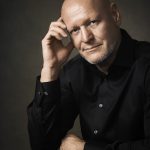
By: Gail Obenreder
“I strive for music that transports the listener, with expression and connection paramount, and to reach both seasoned concertgoers and newcomers.”
In creating his substantial musical oeuvre, Mark Hagerty has determined his own musical path. Working outside of any institution or tradition, he divides his compositions into two “primary streams.” While he continues to write “concert music in the usual sense—orchestral, keyboard, vocal, chamber,” the composer has more recently “embarked on a second stream, engaging in social issues.”
For his first body of work, Hagerty takes inspiration from both nature and science: weather and landscape or chaotic systems and theoretical physics. Combining what he terms “sound sculpture” with emotional expression has led to his current work in progress, Paradoxes, an interconnected suite of twelve independent pieces for orchestra, piano, and percussion. In Woodland, for which Hagerty was awarded the Division’s Masters Fellowship, his exploratory yet accessible writing evokes birdsong and the bucolic atmosphere of a forest morning.
Compelled by “injustice and division in our society,” Hagerty has begun to explore a new compositional stream, one that places his music “at the service of artists whose message can open hearts [and] fire minds.” Here, a pivotal project has been his collaboration with Delaware’s Poets Laureate, the Twin Poets (Albert Mills and Nnamdi Chukwuocha) on United Sounds of America. Highly regarded by the Fellowship juror, this forty-minute work for spoken word, piano, percussion, soprano, and orchestra was premiered at the University of Delaware in May 2022.
United Sounds of America No. 11 [featuring the Twin Poets], 2022
Length of full work: 39 minutes
Role in creation: Composer
Now a Wilmington resident, Hagerty grew up in Cleveland, Ohio. He lived and worked there, as well as in Boston, Geneva (New York), and Leiden (The Netherlands). “Engrossed in serious music since early childhood,” he covered the walls of his room with “images of the great composers of the 18th and 19th centuries.”
In high school. Hagerty studied trumpet, voice, and musical theory and was “encouraged to compose.” At Oberlin Conservatory, he first majored in trumpet, then voice, but he finished with a degree in composition, studying with Richard Hoffmann, “himself a student of Arnold Schoenberg,” one of Hagerty’s youthful heroes.
While always considering himself first a composer, Hagerty has also worked as a machinist, programmer, freelance science editor, technical writer, and executive in high-tech companies here and in The Netherlands. He’s been devoted full-time to music since 2015, but his interest and expertise in these technical and scientific fields continues to fuel and undergird his music.
Since 2000, Hagerty has written over 40 major instrumental and orchestral works, including commissions from prominent musicians or musical ensembles. His Woodland concerto (also submitted for the Division’s consideration) was commissioned for Israel’s Tefen Music Festival, where it premiered in 2019. Hagerty’s compositions appear on over fifteen recordings, some compilations, some dedicated solely to his works.
03 Nocturne, Mvt. II of Woodland, 2022
Length of full work: 24 minutes
Role in creation: Composer
Even with this substantial catalog of compositions, Hagerty still finds that his biggest challenge is “to position your work where you can create something new while maintaining a connection to a varied audience.” Temperamentally he has always leaned toward the revolutionary (even as a youngster) and was trained in serial nontonal composition. But he believes that today “overtly experimental works feel tired and dated” and strives to combine original ideas with an accessible musical language.
The composer is deeply rewarded when his struggle to “give form to an inspiration [becomes] a performable piece of music.” He previously received a Division award and is grateful for the continuing support and recognition that Master’s Fellowship brings. Hagerty plans to use it to expand his current practice, helping to cover the considerable costs of score production, recordings, web site, and marketing, allowing his fluency in musical expression to create new works skillfully crafted “to suit [both] performers and audience.”
Related Topics: 2024 Artist Fellow, Delaware Individual Artist Fellow, Mark Hagerty